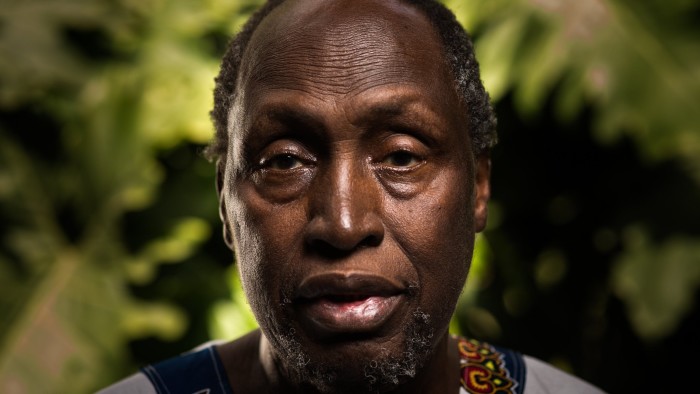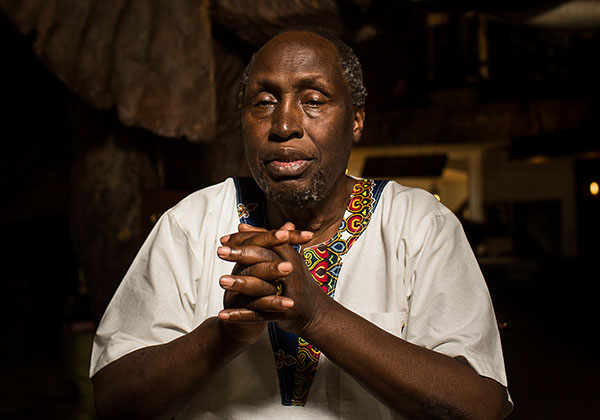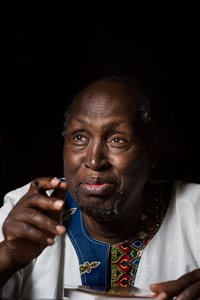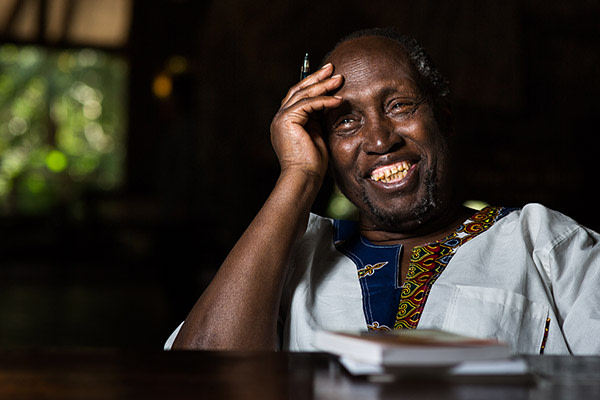‘It was defiance’: an interview with Ngugi wa Thiong’o

Simply sign up to the Life & Arts myFT Digest -- delivered directly to your inbox.
Ngugi wa Thiong’o cringes in mock horror. He holds his face in incredulity. The 78-year-old Kenyan writer is Macbeth looming over Banquo, vanquished on the floor; next, a congressman denouncing Ngugi wa Thiong’o from the chamber; then an author writing a novel on scraps of prison toilet paper in his damp cell. Ngugi, as he is known, comes from an oral tradition of storytellers — fireside tales spun by tenant farmers in the country’s highlands — and his technique is flawless.
I have come to meet Ngugi at the University of California, Irvine, where he has taught comparative literature for more than a decade. A novelist, playwright and essayist who sits alongside the likes of Nigeria’s Chinua Achebe and Wole Soyinka in the modern African pantheon, he is a perennial favourite for the Nobel Prize in Literature, which this year went to Bob Dylan. Ngugi’s life encompasses the terror of English colonialism, the pain of the independence struggle, the tragedy of despotism in a free Africa, the displacements of exile and the heights of literary fame. He traces his journey through to the end of university in three recent volumes of memoir, 2010’s Dreams in a Time of War, 2012’s In the House of the Interpreter, and the newly published Birth of a Dream Weaver.
A Nobel, he tells me towards the end of our three-hour chat, would be validating but not essential. Six years ago, he shot to the top of betting on the day the result was to be announced, only for one of his daughters to call to tell him that Peru’s Mario Vargas Llosa had won. He recalls the faces of the photographers who had gathered outside his home in anticipation of his victory: “I was the one who was consoling them!”
We are sitting beneath sycamore trees at the University Club on a sunny afternoon. Knots of students buzz at tables all around us. Ngugi’s wife, Njeeri, who is the school’s director of conflict resolution, has joined us for what turns out to be an alfresco Mexican buffet.
. . .
Ngugi was born in 1938 in Kamirithu, a village north of Nairobi, one of 28 children of a mercurial father with four wives. In the 1950s, his older brother, Good Wallace, joined the Mau Mau uprising against a ruthless British occupation whose prison camps were described by the then-solicitor general as having been “distressingly reminiscent of conditions in Nazi Germany or Communist Russia”, according to secret documents released by the Foreign Office in 2012.

The British response to the rebellion was brutal and relentless. It even extended to weaponising language itself, says Ngugi. “The British gave it the name of Mau Mau because it’s meaningless — as if to say it was a meaningless movement,” he says. “If they had said, ‘Land and Freedom Army’, as [the fighters] called themselves, then they would be articulating the aims of the movement, right?”
Ngugi’s half-brother Gitogo was shot in the back and killed for refusing to obey a British soldier’s command. He hadn’t heard it because he was deaf. His mother, who is the driving force behind his work, was detained in solitary confinement for three months.
Ngugi has small, rheumy eyes that brighten like sunburst under cloud cover and a brow that wrinkles into a dozen fine arches. When I ask him whether age has mellowed the fiery radical who revolutionised African literature, he says: “I don’t know what you mean by mellowed — there are themes that are important in my life and I keep on looking at them.”
Those issues were laid out in his early novels — particularly 1964’s Weep Not, Child — which were furious, revelatory depictions of the brutality of British colonialism. In the 1970s and 1980s, Ngugi began advocating a strident version of intellectual anti-colonialism, forswearing English in favour of his mother tongue, Kikuyu, and arguing that others should follow suit.
His polemical work coincided with the hangover that followed many African independence movements. In 1968, along with two fellow academics, he published a treatise calling on Nairobi university to rename its English department and rewrite its curriculum in order to bring African literature into the centre of its study, an argument that has influenced postcolonial studies throughout the world. In another work, Decolonising the Mind (1986), he elaborated on his rationale: “the bullet was the means of the physical subjugation, language was the means of the spiritual subjugation”.

I wonder what he makes of the fact that today most well-known African writers publish in English, often from abroad. In 2013, Ngugi said that such writers — including his son Mukoma, a professor at Cornell University, and one of four published authors among his nine children — are part of a “metaphysical empire”, contributing to the expansion of English. But now he seems to have softened his view.
“I’ve always made a distinction between what we ought to do and what we have to do,” he protests. “Some of the younger writers grew up as English speakers in their homes . . . Do they wait until they have mastered an African language to write? No.”
. . .
Ngugi’s embrace of Kikuyu began in earnest with his 1977 play Ngaahika Ndeenda or, I Will Marry When I Want. The story of a farmer swindled out of his land by corrupt elites, it dealt directly with the plight of ordinary Kenyans and cast untrained villagers in starring roles. The play was a hit for six weeks before the authorities shut it down. On New Year’s eve, then vice-president and later dictator Daniel arap Moi sent Ngugi to the notorious Kamiti Maximum Security Prison. There he wrote Devil on the Cross — in secret, on prison-issued toilet paper — and followed it with Detained: A Writer’s Prison Diary. An Amnesty International campaign helped to free him after one year of detention. It was in prison, he tells me, that he became determined to write only in Kikuyu.
“It was defiance. In this place I’m going to write in the very language which is part of my incarceration,” he says. “But there is something else that happened when I was in prison: I started thinking more deeply . . . [about how] the colonists always impose their language on the colonies.”
Yet in the second volume of his recent memoirs, the colonial boarding school Ngugi attended as a boy seems to act as a sanctuary amid the tumult ripping his country apart. Would it be fair to call this nostalgia? In a sense, he says. “When you are inside the high school . . . you feel you are in a magic place — a magic garden — meaning all around you the world is still going on, the killings, the concentration camps, mass hangings. All this is going on but you are in this safe place.”
He returned home from high school for the first time to find “a rubble of burnt dry mud, splinters of wood, and grass” — the British had razed his entire village. “That moment of return — devastation, having to try and find out where they are, the reconnection — has become a very important image in all my writings,” he says.
His was a typical colonial school, with a focus on the classics. Ngugi forged an intense connection to Shakespeare. I tell him that it seems odd that such a strident anticolonialist should be so taken with, as Cambridge university’s Edward Wilson-Lee puts it in a recent book about the bard in Africa, this “talisman of Englishness”, which colonialists had brought to keep themselves from “going native”.
“This guy is incredible,” he says. “Of course they would never have allowed us to read The Communist Manifesto . . . or any literature that they deemed might connote violence. But Shakespeare, he’s full of violence. There’s blood in every page of his plays! No change comes peacefully: one king is killed by another, armies from France [invade] . . . And this is what they are teaching us!”
In Birth of a Dream Weaver, Ngugi writes that he entered university “in July 1959, subject of a British Crown Colony, and left in March 1964, citizen of an independent African state”. In 1962, he was invited to a landmark symposium of African writers working in English, including Achebe, Soyinka and the South African Lewis Nkosi. “Everything seemed possible,” he says. “We could sense a new world was coming to be.”
Ngugi had been elated to be included in the conference. But afterwards, he read a critique by Nigerian poet Obi Wali, “who lamented the fact that, for an African writer’s conference, there wasn’t a single text, not a single writer who wrote in an African language”. Ngugi would ultimately use this insight to upend Kenyan letters — which would eventually lead to his exile.
In 1982, Ngugi was in London when he was warned that if he returned to Kenya he would receive a “red carpet welcome”, of the sanguinary variety. He lived in exile for the next 22 years, while his children and their late mother in Kenya endured periodic abuses from the authorities.
In 2004, two years after Moi was defeated in democratic elections, Ngugi returned. It was to be a triumphant homecoming for the country’s most celebrated writer, as he launched Wizard of the Crow, an 800-page allegorical magical realist satire that he had written in Kikuyu. He has said that the most beautiful line in the English version that followed is, “A translation from Kikuyu by the author”.

But his trip ended in tragedy. Armed men stormed his apartment in Nairobi, beat him, burnt him with cigarettes and sexually assaulted Njeeri. He has visited Kenya many times in the years since, but I ask him whether the attack colours how he sees his homeland. “This is a dream — you are returning to your own country that you love. I spent 10 years writing a novel in Kikuyu . . . We are about to launch the novel and I am attacked . . . ” he trails off.
It is clear that his relationship with Kenya remains complicated. He has twice been received by the country’s current president, Uhuru Kenyatta — son of the country’s founding father, Jomo Kenyatta who, Ngugi has written, “introduced de facto one-party rule” and handpicked as his successor the man who imprisoned Ngugi.
In 2013, when the younger Kenyatta was elected, Ngugi noted in a sceptical New York Times op-ed that he and his running mate both faced charges of crimes against humanity before the International Criminal Court. Today he praises the president: “He didn’t tell me, ‘Don’t talk about this, or talk about this’. Or ‘You can say this or this’. No, no. And I appreciate that . . . it really encouraged me to see a president who was this young and this openhearted.”
Ngugi tells me he plans to retire in Kenya. He doesn’t quite say it, but the moment of return — from high school to find his village razed, from exile into a vicious attack — looms large, and it is hard not to sense that this has something to do with the conciliatory tone.
“No matter how you are recognised in other countries [with awards or prizes], there is something special about home,” he says. “There’s no point being a prince elsewhere, when you are a pariah at home.”
Photograph: Trevor Snapp
Comments